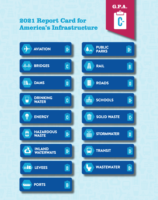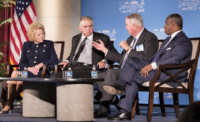The U.S. and China have agreed to increase cooperation on infrastructure investment and to boost private-sector financing for such projects, through public-private partnerships, the two countries say.
On a more controversial topic, the countries also say that China has agreed to limit the expansion of its steelmaking capacity at a time of excess capacity in the industry.
In a joint summary of developments at the latest annual bilateral Strategic and Economic Dialogue, held June 6-7 in Beijing, the U.S. and China said: “Recognizing the important role of infrastructure investment in promoting economic growth, the United States and China commit to further strengthen communication and cooperation on infrastructure development.”
They said that they back “efforts to promote infrastructure investment,” including greater commercial investment in that sector through P3s that include “domestic and foreign investors.”
The two countries also said that they “encourage the dissemination of best practices in the field of infrastructure investment, which is anticipated to spur enterprises of both countries to explore feasible projects and modes of commercial cooperation.”
But they provided no further details, including how much investment they were aiming for.
Lew raised the issue of industrial capacity, including steel, in a statement at the meeting’s June 6 opening session, saying that “much of what we prioritize in our discussions aligns with China’s own stated supply-side reform agenda.” He said that included “undertaking further measures to reduce excess industrial capacity in key sectors such as steel, aluminum, and coal.“
But, according to a China Central Television transcript, China’s finance minister Lou Jiwei, said at a press briefing, "Much of the accumulation [of capacity] was caused by investment increase, especially the investment in infrastructure construction, which promoted the growth of coal, steel, cement and other raw material. “
He added, “At that time, the world applauded for China and thanked China, but now they say China's production overcapacity has encumbered the world. What did they say at that [earlier] time?"
Despite that back-and-forth, at the end of the conference, the two countries issued a joint statement with a lengthy section that dealt with steel in measured phrases, saying that excess capacity in that industry and others “is a global issue which requires collective responses.”
For its part, the U.S. said it supports China’s steps to trim its steelmaking facilities, and noted the China State Council’s recent announcement about plans to shut 100 million to 150 million metric tons of steel capacity and “strictly prohibit” growth in capacity over five years.
Both countries added that they will take part in an Organization for Economic Cooperation and Development steel committee meeting in September and a bilateral “steel dialogue” meeting.
American Iron and Steel Institute President and CEO Thomas J. Gibson said in a statement that his organization welcomes China’s new pledges regarding steel capacity and views the country’s participation in the OECD steel committee meeting as a positive development.
Gibson added, “But these commitments will only be meaningful if they lead to real results that produce a significant net reduction in excess steel capacity in China.”




